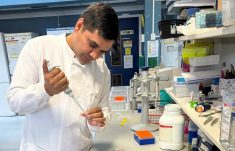The way Glen Jennings sees it, Canadians want to do the right thing, and they’re willing to reach into their own pockets in order to do it.
Few consumers can afford a wind turbine. Still fewer have a place to put one. But they do want to do what they can. And in 15 Co-op Atlantic stores through the Atlantic provinces, they can finally do something concrete about it.
They can pay an extra 1.6 cents per egg in order to help Jennings convert his farm to green energy.
Read Also

Producers aren’t panicking over tariffs and trade threats
The influence of tariff and trade uncertainity on farm business decisions.
The plan is getting marketing assistance and backing from Co-op Atlantic, which has co-ordinated a launch blitz targeted at environmentally conscious shoppers.
At bottom, however, this is a campaign that is all about shared values.
When Jennings took over his family farm at Masstown about 20 years ago, the idea of using wind power to supply electricity to his poultry farm wasn’t even on the horizon.
Today, this fourth generation farmer is one of the pioneers of wind power in Nova Scotia, motivated partly by his determination to create a legacy for his 14-year old son, who is now farming on his own piece
of land. Along with his wife Lisa and father Cecil, the Jennings are well known in Colchester and Cumberland counties for producing quality eggs under their brand, Bayview Poultry Farms Ltd.
Currently, the farm produces 10,000 eggs daily, which are sold to local grocery stores and farm markets. In December, however, Co-op Atlantic introduced Bayview’s “Green Eggs” in 15 of its stores throughout the Atlantic provinces.
Jennings counts off his objectives. In the near term, he’s looking for increased sales and improved profitability, and he’ll be studying sales records to monitor the farm’s progress. He also has longer term objectives, however. He’s committed to making more consumers more aware of farm sustainability, and he wants to help his community by generating green energy.
Since the farm is located on breezy Cobequid Bay at the northeastern tip of the Bay of Fundy, using wind power is a logical choice for reducing the farm’s energy bill for the 12,000-hen operation, complete with grading and refrigeration facilities.
Jennings installed three turbines last summer which, at peak performance, will generate 2.4 kilowatts per hour. Based on wind studies, he expects them to replace 75 per cent of the electricity he has previously had to buy.
At that rate, says Second Source Power, the company that supplied the turbines at a cost of approximately $20,000 per turbine, it will take between five and 10 years for the system to pay for itself, based on energy savings alone.
The Co-op Atlantic premiums, however, will shorten that payback, and ultimately help Jennings achieve his goal of adding enough extra turbines to make the farm completely self-sufficient for electicity, with surplus sales into the Nova Scotia power grid.
A farm-technology graduate of Nova Scotia Agricultural College in 1989, this isn’t Jennings’ first innovation. In fact, he’s been recognized by the Nova Scotia Federation of Agriculture, Co-op Atlantic, Nova Scotia Power, Second Source Power, Nova Scotia Poultry and many other organizations and individuals as an industry pioneer, and he’s in high demand at conferences to talk about sustainable and environmentally friendly farm practices.
The goal of Bayveiw Farms, Jennings says, is to profitably produce the best quality food with as little environmental impact as possible.
Indeed, when asked if charging premium prices for eggs was an initial motivation for installing the turbines, Jennings commented that the ultimate goal is to reduce the amount of energy supplied by NS Power and to use a renewable source of power instead.
Premium pricing of the eggs and possible marketing advantages weren’t the driving force behind installing the turbines, but are welcome advantages.
Bayview Poultry Farms feels comfortable charging an extra 1.6 cents per egg and is confident that consumers will pay, knowing the benefits will go to the environment by using wind energy.
Since the “green eggs” are considered a specialty item, Co-op Atlantic will market the product through various tactics, ranging from shelf signage that tells the story of Bayview Poultry Farms to branded packaging and an article in the Atlantic Cooperator, a newsletter that is delivered to each co-op member.
Like other egg producers, Bayview Poultry Farms follows a quota system per laying hen when determining prices, with the price depending on the number of hens used in production rather than the number of eggs produced.
In a competitive retail market, Co-op Atlantic brands its stores based on close relationships with producers, carrying locally produced beef, pork, potatoes and apples, among a long list of other foods.
Stores that carry the eggs don’t necessarily take a larger profit margin, but sell the eggs in order to offer a variety of local product.
Bayview Farm offers a product that fits into niche markets and which can be differentiated from other eggs by the environmental story of how those eggs are produced.
To a degree, the Jennings are benefitting from empowered consumers who want to see their food produced sustainably. Yet the Jennings are also driving that market evolution.
And that means, says Glen, the family is achieving its objectives. CG














